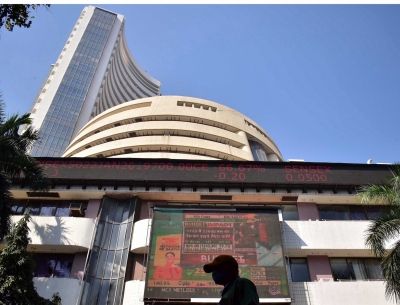At 9.38 a.m., Sensex was down 589 points or 0.69 per cent at 83,686 and Nifty was down 174 points or 0.68 per cent at 25,622. In the early trading hour, broader market trends remained weak. On the National Stock Exchange (NSE), 256 shares were in the green and 1,188 shares were in the red.
Twenty-eight out of 30 Sensex stocks were trading in the red as Wipro, Asian Paints, Tata Motors, M&M, Maruti Suzuki, Reliance, Nestle, ICICI Bank, Titan, TCS, L&T, HUL, Kotak Mahindra Bank, HDFC Bank, Bajaj Finserv, HUL, Axis Bank and Bajaj Finance were the top losers. Only JSW Steel and Tata Steel were in the green.
Among the sectoral indices, Auto, FMCG, realty, media, energy and pvt bank were major gainers. Only the metal index was in the green. This is in line with the performance of Asian peers, which are down by 1.5%. The geopolitical tensions have left investors on edge, as any escalation could have far-reaching implications for the global economy, particularly for countries like India that are heavily reliant on oil imports.
The Middle East is a significant player in the global oil market, and any disruption in the region can lead to a spike in oil prices. This is a major concern for India, which is a significant importer of oil. Raghvendra Nath, managing director at Ladderup Wealth Management, highlighted this concern, stating, “Investors are worried about the Middle East conflict right now as it will have a huge bearing on Indian markets since any rise in oil prices will have an adverse impact on the country, which is an importer of the commodity.”
The impact of the conflict is not limited to the oil sector. Twelve of the 13 major sectoral indexes in India logged losses, with realty and auto indexes set to be the top losers by percentage, dropping about 2.6% and 1.7%, respectively. Among individual stocks, consumer goods firm Dabur lost 5.5% after forecasting its first quarterly revenue decline since 2020. Most brokerage stocks, such as Motilal Oswal Financial Services and 5Paisa Capital, fell about 1.5% each, while SMC Global lost about 2.3%.
Geopolitical Tensions and Global Oil Prices
The geopolitical tensions have also had an impact on oil prices. Crude oil prices slumped to their lowest since December, extending a steep fall of more than 4% in the previous day, amid concerns over lower global demand growth. Brent crude futures for November fell 0.53% to $73.36, after the previous session’s fall of 4.9%. US West Texas Intermediate crude futures for October were down 0.63% at $69.90, after dropping 4.4% on Tuesday. Analysts believe that oil fundamentals are deteriorating sharply, even as the market obsesses about potential supply shocks.
The geopolitical tensions have also affected gold prices. Gold prices climbed one per cent as the dollar and Treasury yields retreated following Federal Reserve Chair Jerome Powell comments signalling an interest rate cut in September. This indicates that investors are seeking safe-haven assets amid the geopolitical uncertainty.
The geopolitical tensions have also had an impact on the economies of West Africa. The upward trend in the cost of goods and services is estimated to continue for the rest of the year. The government has a year-end inflation target of 21.4%. This is highly optimistic and may not be achieved, especially if policy implementation lags are considered. In addition, for a country that is highly import-dependent, the role of the exchange rate cannot be overemphasized.
Impact on Indian Economy and Policy Responses
The geopolitical tensions have also had an impact on the Indian budget. The government projected an expenditure of Rs 47.65 lakh crore for 2024-25, marking a 6 per cent increase over the revised estimate for 2023-24. Interest payments constituted a significant portion, with 25 per cent of the expenditure earmarked for interest payments, accounting for 40 per cent of revenue receipts. Revenue growth, excluding borrowings, were expected to rise by 12 per cent to Rs 30.80 lakh crore in 2024-25, driven largely by a 12 per cent increase in tax revenue.
The geopolitical tensions have also had an impact on the global banking sector. Following a record showing in 2022, the global banking sector continued to exceed expectations during 2023. Global return on tangible equity reached 13 percent in 2023, its highest level since the 2008 financial crisis. Meanwhile, the worldwide Tier 1 ratio hit a ten-year high of 13.4 percent, and net interest margins rose to 2.4 percent, snapping a decade-long contraction.
Long-term Impact and Market Outlook
The geopolitical tensions have also had an impact on South Asia. The Iranian retaliation to the attack by Israel on its embassy in Syria in the form of a barrage of missile attacks threatens a negative impact beyond the region, especially in nearby South Asia which has historical, cultural, religious and economic ties with the Middle-East.
Israel’s attack on the Iranian embassy was a clear violation of diplomatic norms. Yet, the attack elicited no condemnation from Israel’s Western allies, in line with similar silence on Israel’s genocidal six-month war in Gaza. Similarly, in the United Nations they condemned Iran’s attacks, on the premise of self-defense, as disproportionate.

